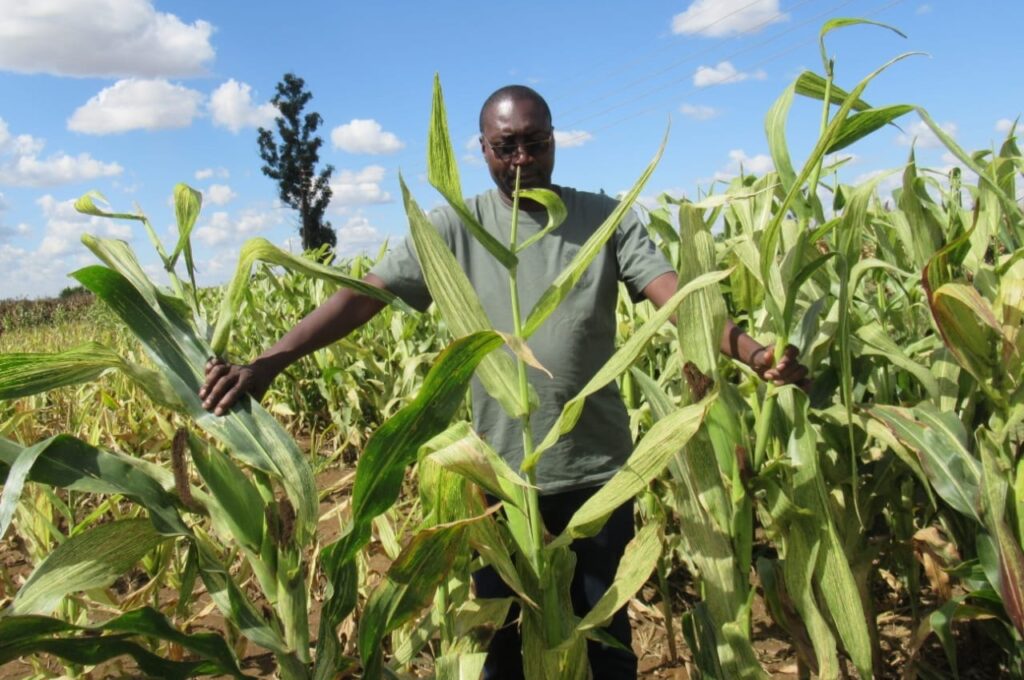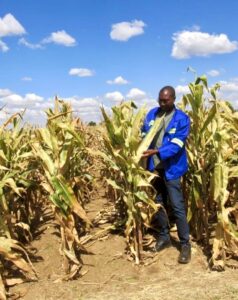
Promising findings in Maize streak virus study
A field of maize streaked with white may be a colourful sight, but for smallholder farmers it signals a disaster. The white streaks are the mark of Maize streak virus, a deadly disease that limits maize production and economic development of households every year in Africa.
“Maize streak virus (MSV) is a major biological threat, causing grain yield losses of up to 100 percent in susceptible varieties,” says Malven Mushayi, a PhD student at the African Centre for Crop Improvement (ACCI), based at the University of KwaZulu-Natal (UKZN) in Pietermaritzburg. His research is focusing mainly on breeding for resistance to MSV, and he has made some promising discoveries so far.
Mushayi’s thesis is titled “Development of Maize Streak Virus Resistant Tropical Maize Germplasm through Phenotypic and Quantitative Trait Loci Analyses,” a topic he says was identified by the need to breed and deploy MSV-resistant/tolerant maize cultivars in sub-Saharan Africa (SSA). “The research is also part of (his employer) Seed Co’s greater efforts to enhance crop resilience to climate change and develop demand-driven maize hybrids for global deployment,” he says. He is working under the supervision of Professor Hussein Shimelis and ACCI alumnus Professor John Derera.
Mushayi is the son of smallholder farmers in Zimbabwe, and is well placed to tackle this challenge. “I am from Chikomba District, Njanja, which is known for its drought-prone conditions. I remember witnessing the devastating impact of crop failures to my parents and community, and seeing the joy on their faces when we had a good harvest. Their experiences and the impact on our livelihoods sparked my interest, and I was motivated to pursue a career in agriculture, particularly plant breeding,” says Mushayi. Mr Nhekairo, an inspiring teacher at his high school was also a prompt.

Before pursuing a PhD, Mushayi gained a solid foundation in agriculture, earning a diploma in agriculture, a bachelor’s degree in crop science and a certificate in project monitoring and evaluation, all in Zimbabwe. This was followed by a master’s degree in plant breeding from UKZN, which focused on investigating methods to widen the genetic base of tropical maize germplasm.
“With over 15 years of experience in research and development at Seed Co group, I have progressed through various roles to my current position as a maize breeder,” he says. In this role, I am focusing on breeding and releasing maize hybrids in the medium and late maturity groups that are adapted to the mid-altitude environments.”

Mushayi’s research began with screening elite tropical maize inbred lines for MSV tolerance under artificial MSV field inoculation conditions. He identified MSV-resistant and susceptible parental lines for use in Quantitative Trait Loci (QTL) analysis.
Next, he screened new Double Haploid (DH) tropical maize germplasm lines and he is using Single Nucleotide Polymorphism (SNP) molecular markers to select lines possessing MSV resistance genes. “I will do QTL Analysis to gain knowledge of the genetic factors underlying MSV resistance in elite tropical maize germplasm,” he says. Mushayi has developed new experimental maize hybrids and is evaluating their MSV resistance, grain yield potential, agronomic performance and stability using multi-location trials. “The goal is to identify high yielding, adapted maize hybrids with MSV resistance as part of their product profiles,” he says.
“Finally, I will assess the combining ability of the new DH lines for grain yield potential, MSV tolerance, and agronomic traits. This will provide knowledge on their combining ability effects, guiding their use for population improvement and heterosis breeding,” he says.
In terms of the challenge, he says MSV resistance, is of polygenic inheritance, and is affected by environmental influences. “Ensuring its stability and durability across diverse environments is crucial. This requires more sites and careful evaluation and testing of resistant germplasm.”
So far, the findings of the study are encouraging. “During the screening process, I identified lines showing variable resistance to MSV, indicating that there is a range of genetic variation that can be exploited to develop MSV-resistant maize varieties,” says Mushayi.
“I have identified new MSV-resistant or tolerant lines that are being used to develop MSV-tolerant and high-yielding hybrids. This is a promising trend, and I am excited to see the potential impact of these lines on maize production,” he says.
“Although I am yet to complete this aspect of my research, the preliminary results from the hybrids’ performance at the sites harvested so far are showing a good combining ability trend. This is a positive indication that the new DH lines may possess desirable traits that can be used to improve breeding populations and heterosis breeding,” says Mushayi.
The first part of his work, the reviews, was recently published in the Frontiers Plant Science Journal (Mushayi M, Shimelis H, Derera J, and Tesfamariam SA, 2025). Breeding for resistance to maize streak virus: challenges, progress, and future directions: a review. Front. Plant Sci. 16:1590870. doi: 10.3389/fpls. 2025.1590870).
Mushayi thanks Seed Co Ltd for funding his projects, germplasm used and for their assistance. He acknowledges the support of his wife, Ruvimbo Magwenya, and his children Mazvita and Chikomborero and family members. He also thanks Professor Shimelis Hussein and Professor John Derera for impacting his research journey.
Article: Shelagh McLoughlin
Photos: Supplied

